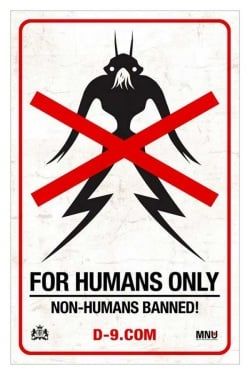Did The District 9 Viral Campaign Actually Work?

This success that District 9 found at the box office over the weekend gave everyone a reason to cheer. It's a smart, well-made, low-budget movie beloved by critics and audiences alike, giving hope that moviegoers will shell out for something more intelligent than Transformers 2, and that critics will open up to movies that happen to include alien warfare.
A lot of credit for the movie's success goes to Sony's extensive marketing campaign, which kicked off with a viral campaign at Comic Con 2008 and led to half the buses in New York City being slathered in "For Humans Only" signs by the time of the film's release. But despite the yearlong campaign, series of viral sites and "What is District 9?" mystery among bloggers, awareness of the film didn't pop until a few weeks ago. Could Sony have saved the marketing campaign until this summer and gotten the same result?
The model viral campaign of the Internet age, the "Why so serious?" Dark Knight effort, had a strong Comic Con presence as well, hyping fan interest in Heath Ledger's Joker character and dropping tidbits about the movie's plot well in advance of the movie's release. But District 9 is a vastly different movie, so unfamiliar and original that even a sign like "For Non-Humans Only" on the bathroom door at Comic Con isn't enough to give audiences a clue of what to expect. .
Despite those early viral efforts, District 9 hadn't really stuck in the public consciousness as recently as March, when Head Honcho Josh and I put our heads together to try and update District 9's preview page. At that point it was still widely rumored that District 9 was a code name for the Halo project that director Neill Blomkamp and Peter Jackson had abandoned, and neither Josh or I even knew if District 9 was an adaptation of Blomkamp's short "Alive in Joburg" (it is, of course). It would be one thing for general moviegoers to know nothing about a movie five months before its release, but Josh and I aren't general moviegoers. We're paid to know this stuff in advance, and when it came to District 9, we were clueless.
Over the summer, of course, the veil was lifted, and by the time this year's Comic Con came around, a "secret" screening of the film was the hottest ticket of the night. But was all that buzz a result of the carefully-crafted campaign of over a year, or the simple fact that a trailer, a preview of footage at ShoWest and early sneak peeks proved that District 9 was something worth seeing? Given that virtually no one knew what the movie was about in the spring, viral campaign or not, it's hard to imagine the long-term strategy was worth it.
Fact is, if District 9 weren't any good, no one would have seen it; Sony knew they had a hit on their hands that didn't require a $100-million opening to be successful, and carefully marketed the thing to exactly the audience it needed. In terms of the end result, it was a perfect strategy. But the web is still littered with viral sites like this one, which don't seem to have capitalized on the fever pitch of buzz that met the film's release. Apparently Christopher Johnson has been running an online anti-MNU campaign this whole time. Who knew?
District 9 will be credited as an example of successful viral marketing, and to some level, it deserves it. But when it comes to the long-term, super-secretive viral campaigns, the success still belongs to the franchise and the remakes, the known properties that will get people seeking clues in YouTube videos. The biggest viral effort at this year's Comic Con was for a sequel of sorts, Tron: Legacy. For all District 9's success, that's still the example to look at going forward.
CINEMABLEND NEWSLETTER
Your Daily Blend of Entertainment News
Staff Writer at CinemaBlend
Most Popular






